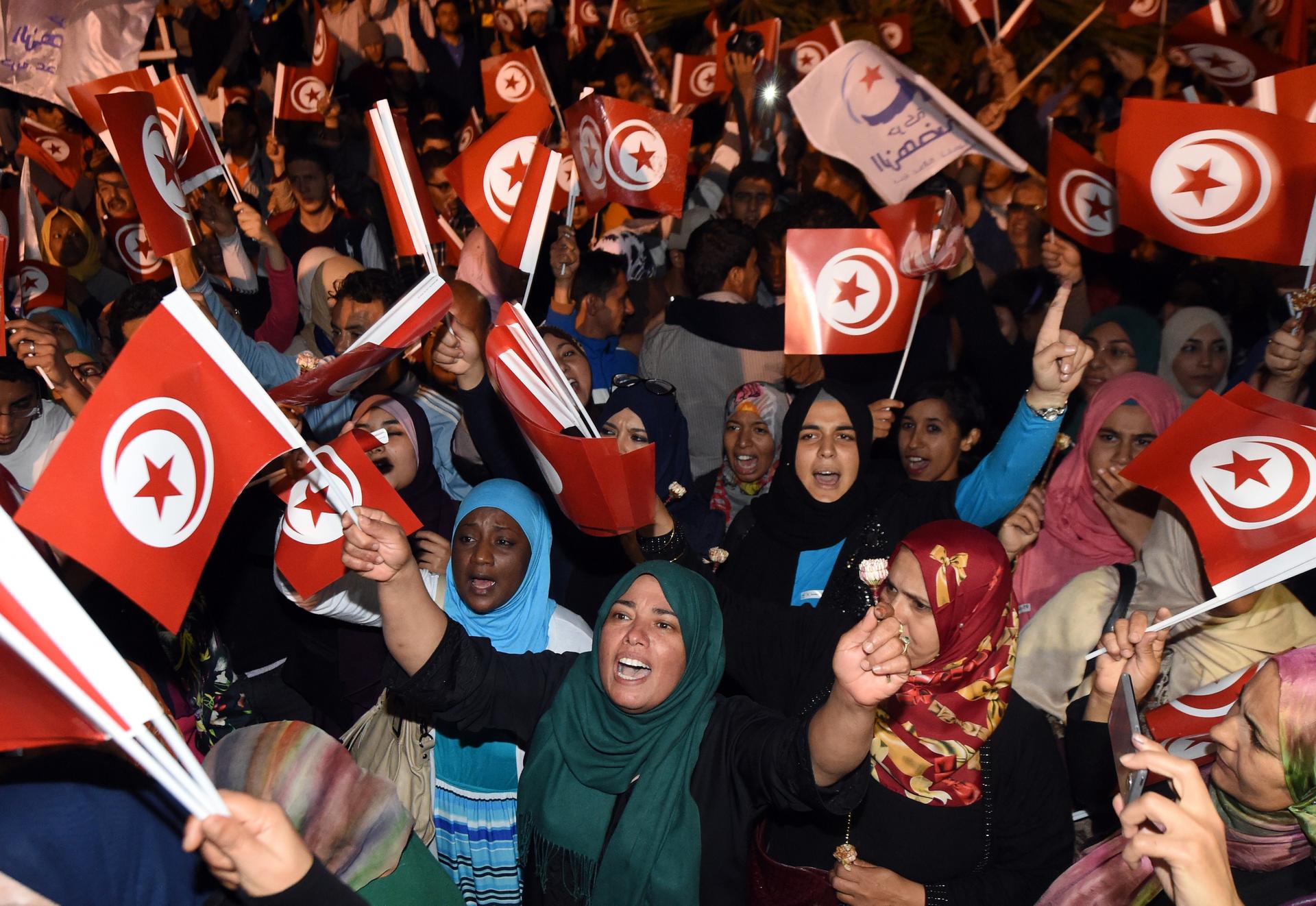Tunisia stands apart as an Arab Spring success story. Here’s what it did differently
Tunisian Ennadha Party supporters wave flags as they wait for the party’s leader to give a speech on October 27, 2014 in Tunis following the legislative election.
TUNIS, Tunisia — Four years after a young Tunisian man set himself on fire in frustration over the dim prospects his country offered, Tunisia is a very different place.
Street vendor Mohammed Bouazizi’s desperate act was the spark that set off the Arab Spring and changed the course of history. But while revolutions elsewhere in the region have been swept aside or stained in blood, Tunisia stands out as a success story.
This weekend the country saw its second parliamentary election since the overthrow of long-serving autocratic leader Zine El Abidine Ben Ali in 2011. Though the official results have yet to be released, all preliminary estimates suggest that the secular bloc Nidaa Tounes will take the most seats, followed by the Islamist Ennahdha party.
In a statement congratulating Tunisians on the passing of another peaceful election, US President Barack Obama said they “continued to inspire people across their region and around the world, as they did during Tunisia’s 2011 revolution.”
So what did Tunisia do differently from those other Arab Spring countries of Syria, Libya and Yemen — all mired in civil wars and unrest — and Egypt, which has fallen back into a brutal military dictatorship?
While Tunisia may be a polarized society, the willingness of its leaders to compromise has set them apart.
The country's first post-revolution election in 2011 saw Ennahda emerge victorious and lead a transitional coalition assembly. But tensions grew when it pursued an agenda that was viewed by many as too conservative.
The party's failure to crack down on Salafi attacks on events and places of business they deemed un-Islamic, the controversial statements of some of the party's more conservative members, and rising security fears after the assassination of two secular politicians made many Tunisians nervous.
Mounira Salhi, 37, voting for the first time, said she had cast her ballot for Nidaa Tounes this weekend “because Ennahdha scared people and created problems between the leftists and the Islamists even though we are all Muslim and we all pray.”
The signs were worrying, but under pressure at home and perhaps wary after the ouster of an elected Islamist government in neighboring Egypt, Ennahdha chose to compromise.
When secular politician Mohamed Brahmi was assassinated in July 2013 by suspected Salafi extremists, a national dialogue was initiated which led to Ennahda surrendering power to a transitional technocratic government six months later. The move diffused tensions and paved the way for this weekend's election.
“In any other country I would say [the idea that they would cooperate or form a coalition] would be far fetched,” says Amy Hawthorne, a resident senior fellow at the Rafik Hariri Center for the Middle East. “However this is Tunisia, and there’s a process of consensus-building and a real desire for stability and stable government.”
That's not to say Tunisia’s path to becoming a functioning democracy is complete. The country has muddled through this transitional period, battling economic stagnation and a growing threat from extremist groups.
Election observers noted low turnout among voters under 30 over the weekend. In the past few years there have been many indications of youth disillusionment with the democratic transition, frustration, and alienation from the political process.
“They feel disconnected, they don’t feel that any of the political parties or political leaders represent them,” said one observer in the coastal city of Sfax.
Some Tunisians are also concerned about the return of former members of the Ben Ali regime, many of whom are part of the Nida Tounes coalition.
“We made a revolution, saying ‘RCD [Ben Ali's party], leave!’ and then people brought them back at the ballot box!" said Ithar Jendoubi, an 18-year-old high school student at a post-election Ennahdha rally.
Three years into Tunisia’s Jasmine Revolution, and despite its successes, the country has a long way to go.
“All that has changed is that people talk politics here now,” said one resident of Kasserine, an impoverished province away from the prosperous coast, following the vote.
But in a place where dissent was almost entirely silenced for 30 years, that change alone is hugely significant.
Every day, reporters and producers at The World are hard at work bringing you human-centered news from across the globe. But we can’t do it without you. We need your support to ensure we can continue this work for another year.
Make a gift today, and you’ll help us unlock a matching gift of $67,000!
